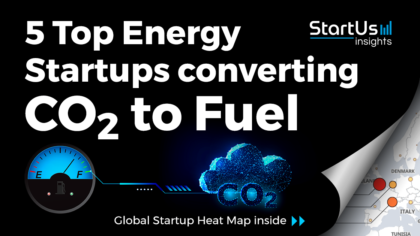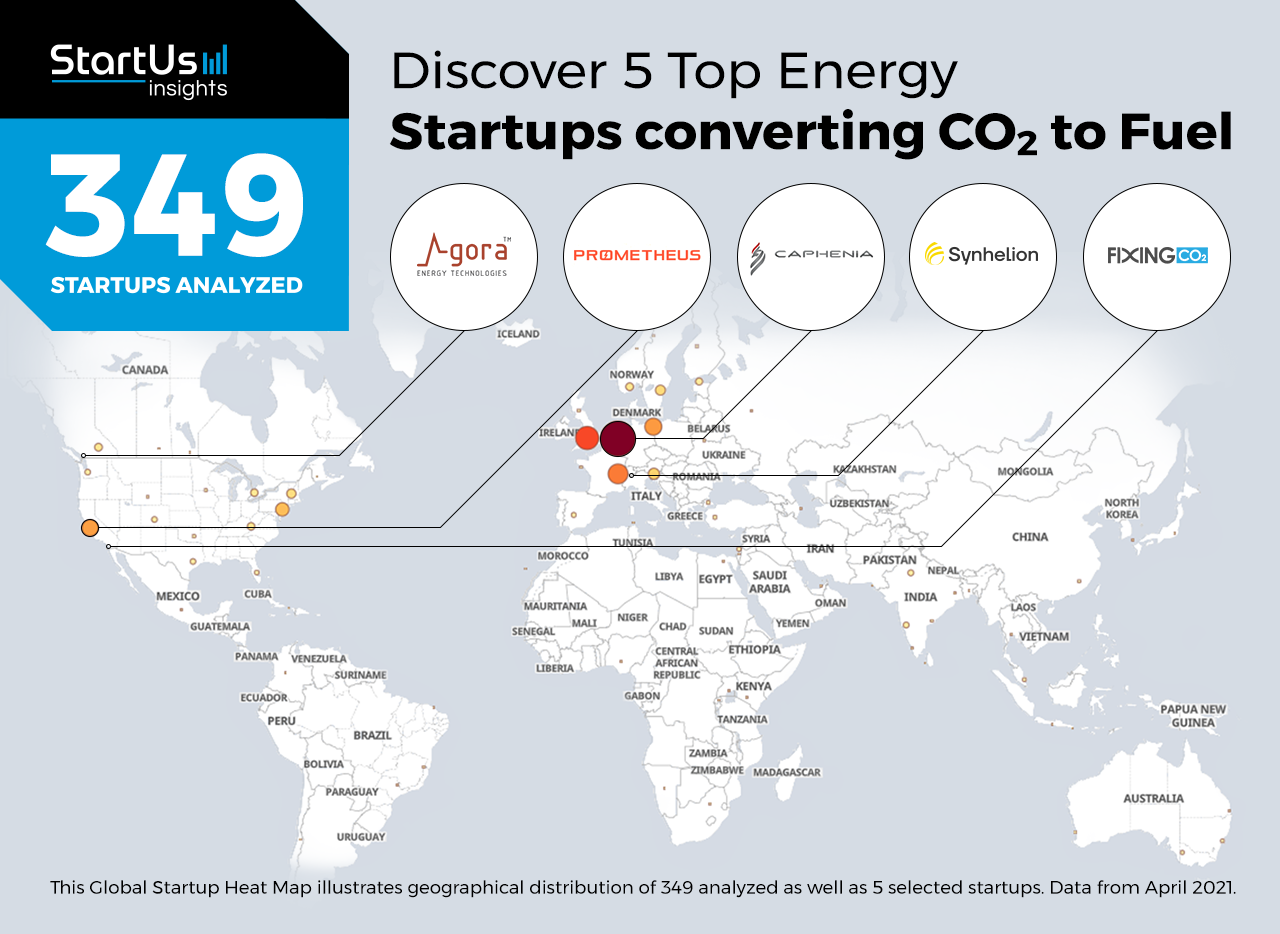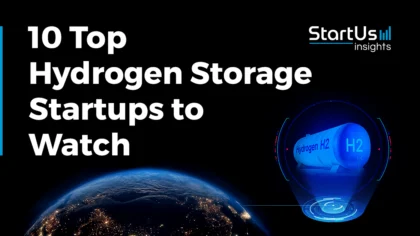Staying ahead of the technology curve means strengthening your competitive advantage. That is why we give you data-driven innovation insights. This time, you get to discover 5 hand-picked energy startups converting CO2 into fuel.
Global Startup Heat Map highlights 5 Top Energy Startups Converting CO2 to Fuel out of 349
The insights of this data-driven analysis are derived from the Big Data & Artificial Intelligence-powered StartUs Insights Discovery Platform, covering 2.093.000+ startups & scaleups globally. The platform gives you an exhaustive overview of emerging technologies & relevant startups within a specific field in just a few clicks.
The Global Startup Heat Map below reveals the distribution of the 349 exemplary startups & scaleups we analyzed for this research. Further, it highlights 5 energy startups that we hand-picked based on criteria such as founding year, location, funding raised, and more. You get to explore the solutions of these 5 startups & scaleups in this report. For insights on the other 344 solutions, get in touch.
Fixing CO2 develops an Electrochemical Reactor for CO2 Conversion
Carbon electrolysis is one of the most effective ways to reuse carbon dioxide from the air or emissions from factories. With CO2 being the primary reason for the global rise in temperatures, large-scale adoption of CO2 electrolysis helps control emissions. Startups develop enhanced carbon capture and carbon reduction mechanisms to steer economies towards a cleaner environment.
Fixing CO2 is a US-based startup that combines electrochemistry and renewable energy to turn CO2 emissions into high-value products. The startup’s electrochemical reactor utilizes clean energy from light and wind to recycle CO2. The startup combines the produced carbon monoxide and hydrogen gas to develop syngas, which is convertible to liquid hydrocarbon-based fuels. Fixing CO2’s selective process offers a commercially viable solution to implement a zero-emissions economy.
Agora Energy Technologies manufactures Electrochemical Energy Storage Devices
Energy storage is a major concern during electricity generation as it needs extensive infrastructure and low standby discharge. Advancements in CO2 electrolysis enable startups to generate electricity from CO2 emissions as well as from the air. Startups are further formulating innovative approaches to improve battery life and reduce storage size. This way, batteries are able to power high-performance machines as well as the grid.
Agora Energy Technologies is a Canadian startup that converts CO2 to energy using its CO2 redox flow battery (CRB). The startup’s proprietary electrochemical energy storage technology utilizes chemical reduction and oxidation reactions on CO2. CRB uses carbon dioxide emissions from industries and renewable energy for charging. And, during the discharge phase, it powers the grid. Agora’s low-cost energy storage device reuses CO2 emissions to offer kWh to MWh energy storage and generation with its batteries.
Synhelion produces Solar Fuel using Thermochemical Reaction
Synthetic fuels are the practical alternatives for fossil fuels used in automobiles, ships, and rockets. Advancements in carbon capture and synthetic fuel generation enable startups to develop fuel alternatives from CO2, thus reducing carbon accumulation in the atmosphere. This allows industries to directly integrate alternative fuels without retrofitting existing infrastructure and move towards sustainability faster.
Swiss startup Synhelion uses solar heat to convert CO2 into solar fuels such as kerosene, methanol, diesel, and more. The startup utilizes a mirror field to concentrate solar radiation onto the receiver, converting it into high-temperature process heat. Further, a thermochemical reactor uses this heat to produce syngas from CO2 and water. Synhelion adopts standard gas-to-liquids technology to transform the syngas into fuels. The startup’s solution replaces the use of fossil fuels to power airplanes, ships, trucks, and cars.
Prometheus makes Net-Zero Gasoline and Jet Fuel
Governments worldwide are adopting net-zero practices to battle climate change. While modern automobiles are engineered in hybrid or electric mode to reduce emissions, modifying older vehicles to control emissions is not viable. This is where synthetic fuels function as a cost-effective and clean solution. Startups utilize CO2 in the air to produce net-zero fuels and readily replace conventional fossil fuels. This allows automobile manufacturers and owners to shift to net-zero energy use.
Prometheus is a US-based startup that captures CO2 from the air to produce net-zero gasoline and jet fuel. The startup’s Titan Fuel Forge, its fuel generation unit, comprises 4 stages: carbon salvage, charging, molecular sorting, and custom assembly. Initially, strong fans draw air into the carbon salvage tower, where CO2 and water are isolated. In the charging stage, the startup utilizes a Faraday Reactor for CO2 electrolysis and produces long-chain alcohols, in turn, liberating oxygen. Further, the molecular sorting stage uses a Maxwell core membrane and carbon nanotubes to isolate alcohols from water. The isolated alcohols are forwarded to custom assembly to produce desired fuel.
CAPHENIA creates Synthesis Gas
Biogas is an alternative for daily needs at homes and other small-scale applications such as cooking and water heating. Biogas is often impure and may corrode metal parts of the engine if used as fuel. That is why very few automobiles integrate biofuel into their fuel system. However, improvements in carbon reduction and carbon processing technologies allow startups to elevate biogas usage. These startups use biogas and CO2 to produce high-value fuels and chemicals, which aids transition into sustainability.
German startup CAPHENIA produces syngas from biogas, carbon dioxide, water, and electricity using controlled chemical reactions in their 3-in-1 zone reactor. The startup’s energy-efficient process includes a plasma zone that breaks down methane (CH4) into carbon aerosol (C) and hydrogen (H) at high temperatures. This carbon aerosol and CO2, from biogas, direct-air-capture (DAC), or CO2 flue gas, combine to form carbon monoxide (CO) using the Boudouard reaction. Further, the excessive carbon from the Boudouard reaction reacts with added water vapor in a heterogeneous water gas shift zone (hetWGS), producing synthesis gas. CAPHENIA’s syngas production process improves CO2 neutrality as well as offers complete selectivity and zero by-products.
Discover more Energy Startups
Energy startups such as the examples highlighted in this report focus on blockchain, DERs, energy storage as well as renewables. While all of these technologies play a major role in advancing the energy industry, they only represent the tip of the iceberg. To explore more energy technologies, simply get in touch to let us look into your areas of interest. For a more general overview, you can download our free Energy Innovation Report to save your time and improve strategic decision-making.









